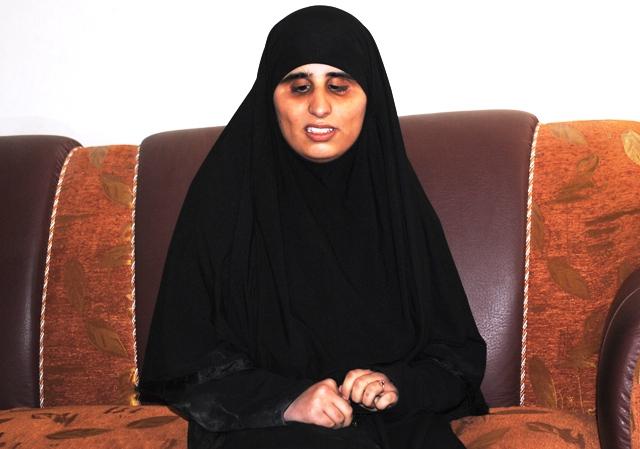KABUL (Pajhwok): Even government offices have flouted the law on jobs for the disabled, according to an Independent Media Consortium (IMC) investigation.
Article 22 of the Law on Rights and Privileges of Persons with Disabilities says 3 percent of jobs in all offices — whether private or government — have to go to the disabled.
But estimates by the Ministry of Labour, Social affairs, Martyrs and Disabled (MoLSAMD) say a mere 0.2 percent of people in the government are disabled. Of 376,000 government employees only 637 have been hired in the category of the disabled.
The disabled are discriminated against, and are often single, jobless, poorly educated, abused and forced to beg for a living.
Jobless
Many people IMC spoke to say their disability has come in the way of their finding work. Mohammad Nabi, 27, from Shiberghan, the capital of Jawzjan province, was born blind. He was agitated by the government’s failure to implement Article 22.
He said the sightless could work on computers but high-ranking government officials have not recruited people like him.
Abdul Khalil, 36, of Surkhi Parsa district in Parwan, who lost a limb to a landmine, says: “Any government office I go to people abuse me.”
Some, however, have been lucky. Ziauddin, 26, Khushk Aba village in the Khak-i-Safid district of Farah who is paralysed waist down. An engineering graduate from Nangarhar University, he says it took him a while to find work.
“I had no luck for eight months. Wherever I put in my CV they told me I was disabled. ‘You cannot work’. I was very disheartened,” he told IMC.
His luck turned when the head of the Farah agriculture department got in touch after reading an interview with him by Pajhwok News Agency. Now he is an engineer in the agriculture department.
Amina Azimi, 32, executive director of the Afghanistan Landmine Survivors Organisation (ALSO) lost her right leg in a rocket attack on her house in 1992. She said she had enormous trouble finding a job after class 12.
“When I went to different offices I was asked, ‘Why are you seeking work, those who are healthy are jobless, how can we find a job for you’?”
She did not reveal details of who these people were but said she had a word of advice for them: “My message is that they should not think disability is a weakness.” It is important to implement Article 22, she adds.
Mohammad Ali Mohabati, who heads the landmine survivors’ rights department in the Afghanistan Independent Human Rights Commission (AIHRC), says the government has been told to implement the promise of jobs.
Ali Iftikhari, a spokesperson of MoLSAMD, says they have tried to enforce the law. “We have had coordinated sessions with government sectors … We have frequently said this (Article 22) is not our (ministry) order but a law.”
According to him, 4 percent of his ministry’s 7,225 employees were disabled. MoLSAMD reports between 2008 and 2013 reveal 897 disabled including 717 male are working in international organisations.
Discrimination
IMC interviewed 36 people born with disability who complained bitterly of discrimination. When war disabled get 5,000 Afs (87 USD) as disability allowance why are others deprived, they asked. MoLSAMD reported 108,894 people were drawing the war disability allowance under Article 7 of the disability law.
The allowance, 450 afs in 2002, rose to 600 afs in 2008 and became 5,000 afs from January this year.
Mohammad Aziz Rasa, the director-general of the affairs of disabled and heirs of martyrs at the ministry, said non-war disabled can make use of other concessions for instance health, educational services etc.
Zainab, a law student at Ariana Institute of Higher Education who is blind is disturbed by the attempt to divide the disabled in two groups. “Why are there two categories? It should be eliminated,” she said.
Abdul Ghaffar Mohmand, the headmaster of Kabul’s school for deaf and blind, who is also hearing impaired and spoke to IMC through a translator, said, “All disabled should have equal rights.”
Ehsanullah Fayaz, the principal of another school for the blind and head of the National Association for the Blind, said they have tried to fight discrimination through the AIHRC but their efforts have not yielded results.
They intended to take their fight to the judiciary. “Our next step is to plan how to plead for justice so that all disabled can benefit from the privileges without discrimination,” AIHRC’s Mohabati said. All disabled, whatever the disability, should get a monthly allowance, he believes.
MoSAMAD’s Rasa promised to amend the law for the disabled in the national assembly to comply with international conventions.
Education
Under Article 19 of the disability law the ministries of education and higher education have to prepare a comprehensive policy for the disabled.
Some 15 deaf and blind people interviewed by IMC said facilities for special education were available in only some provinces.
Khalida, 36, from Shin Kot village near Shiberghan, said her 9-year-old grandson is deaf. “We hope a school will be built in Shiberghan … or his future will be bleak,” she says.
Qari Saifullah is visually challenged, and from Nahrain district in Baghlan province. He also complains about the lack of educational facilities for the blind in the province.
Saifullah, a graduate from a special school and teacher training centre for the blind in Pakistan, says: “I tried many times to establish a school for blind in my province but wherever I went no one paid attention.”
Parveen Azimi who works for an NGO working for the deaf and blind which she did not want to name, says that a joint survey by UNDP and Handicap International (a UK-based disability charity) conducted five years ago found 196,000 disabled children of school-going age.
Mohammad Asif Nang, deputy education minister, confirmed there were only two high schools for the deaf in Kabul and one in Herat; and one high school each in Kabul, Kandahar, Herat, Balkh, Nangarhar and Ghazni for the blind. The schools have a capacity of only 2,500 students.
There is also a shortage of teachers, which could be relieved somewhat in three years with the training underway of 22 trainers. The plan also includes special education for blind and deaf up to high school, and separate hostels for female and male students.
According to Nang, books in Braille including the Holy Quran will be printed by a publishing house in Kabul.
Akhtar Mohammad Abeeri, a spokesperson for the Ministry of Higher Education, admitted the ministry has failed to provide either seats or special facilities for the visually and hearing disabled in universities.
Vocational programmes
Under Article 20 of the disability law the disabled should be provided facilities for vocational training. But at least 50 people interviewed across 20 provinces including Kapisa, Ghor and Laghman, said they failed to get admission since there were only limited seats.
Mohammad Omar, a resident of Deh Sabz district in Kabul province, who lost a leg in a mine explosion a few months ago, urged the government “to do something for the disabled that they can do their own work and not be a load on the community.”
MoLSAMD spokesperson Iftikhari said 20,000 physically challenged students have been admitted in vocational training programmes over the last 12 years.
Begging for a living
The disabled are often forced to turn to begging as a livelihood. Rahimullah, 26, from Mazar-e-Sharif has been begging in Kabul’s Abdul Haq square. He said he was left crippled by a fall off a mountain side while he was grazing sheep above Mazar. His family of six survives on what he gets as alms.
Ghulam Rasoul, 60, from Takhar, lost one hand in an accident. He begs outside the Ministry of Communication and Information Technology in Kabul. “I have 10 family members to support, and I have no choice. My two sons are still very young. I have to beg,” he told IMC.
Discrimination
Two-thirds of the disabled interviewed said they face abuse and insults. A former army officer, Mohammad Khan, 55, Hesa Dowom of Behsud district in Maidan Wardak, was crippled by a landmine 20 years ago.
“We disabled are ignored and insulted. People call us lame, blind!” Khan said he had been in the army till 1992. “There were 50-60 soldiers, and officers, under my command. I was respected in the community and tribe. But now I am called, “lame”,” he lamented.
Zainab, who is blind, is a student at Ariana Institute of Higher Education. She complains of the prejudice faced every day. “I was walking up the stairs in the university when two men, who were coming down, said. ‘What is the necessity for the blind to study? What is she learning’?”
Matiullah Sahel lost a limb in a mine explosion in Kandahar when he was in the military. “People refer to us by our disability. When I arrive at a big gathering like a wedding feast, they say, ‘Make space for the lame’. Don’t I have a name?”
Marriage
Disability is a major hurdle for those who want to get married. Masjidi, 38, was born with one leg shorter than the other. He begs near Tamim Ansar shrine in Shohada Salehin in the capital. “No one is ready to marry me.”
Asked if he was married, Ghulam Rabani, a 43-year-old resident of Rukha in the Panjsher Valley who was crippled by a landmine 23 years ago, laughed and said, “What can I say, it is God’s will.” He said he has asked many girls to marry him but no one was ready to.
Mohammad Khan, the head of an association for the disabled in Maidan Wardak said recently a young man called Mohammad Ibrahim who was engaged lost his leg in a mine explosion, and the girl’s father broke the engagement.
Information
Abdul Ghaffar, the head of a high school for the deaf in Kabul, urged the government to ensure the disabled have access to information. TV channels should have announcers speaking in sign language, he said.
Such programming was introduced by the interim and transitional governments in early 2000 under Dr Sayed Makhdoom Raheen, the then minister of culture and information.
Raheen who became minister again in 2009 has promised IMC that national TV would reintroduce such programming.
*Independent Media Consortium is a joint initiative of Pajhwok Afghan News, The Killid Group (radio and print media), Saba Media Organisation (Saba TV-Radio Nawa networks) and daily newspaper Hasht-e-Subh. This story is part of a series of investigative reports on corruption and human rights cases supported by Tawanmandi.








GET IN TOUCH
NEWSLETTER
SUGGEST A STORY
PAJHWOK MOBILE APP